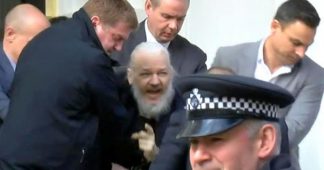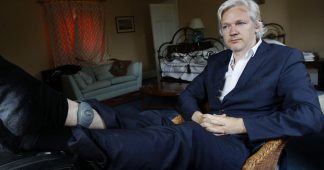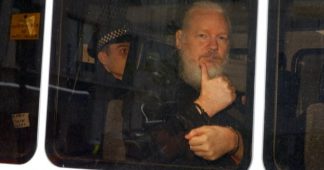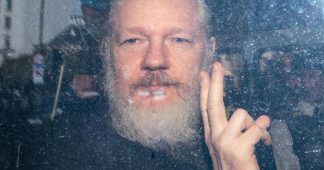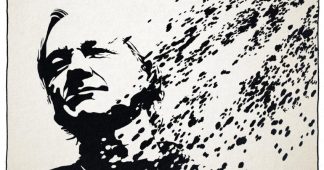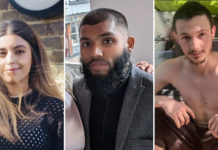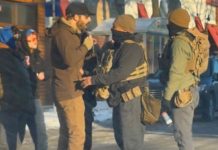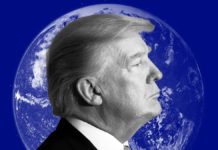How to break walls
From a “Dark place” to a fantastic meeting
By Monika Karbowska
In May 2019, when I started to deal with « The Assange Case », I first planned on revealing the confused plot based on the Swedish allegations fabricated against him. I mainly wanted to « clean my own » feminist sphere because, in my opinion, they let themselves be the puppets of questionable organizations and they strayed into manhunts both media-crazed and illegal. Then summer came and Julian Assange, as a man, got totally forgotten to a point we could wonder whether he was real. Was he dream, a ghost or just pure fiction ?
And then I joined Wikijustice Committee, born from the Yellow Vests movement, and I was finally able to share with my comrades from the committee, the doubts I had always held concerning the inconsistency of the case : from the incongruities in the Ecuadorian diplomatic mission – mentionned in a previous article – to my concerns regarding the strategy adopted by the legal team. And because I had to face repression myself, it was naturelly that I carried out a critical review. We considered the « human side of the problem » : Julian Assange’s personnality, his personal background, his familly, his relationships… And the situation that appeared to us grew more and more complicated. His loneliness, his social isolation and his deprivation of human contact made us fear the worst : could it be that the Assange case is one of the biggest scandal ever in today’s West Europe ? The story of an « extraordinary rendition » meticulously organized over a ten-year period, aiming at isolating him, slandering him and then keeping him locked in, thought it is grotesque and illegal, before destroying him both mentally and physically, and throwing him in a « dark hole » – whatever may be the name of such a place, Belmarsh or somewhere else, and there you can insert the name of any American base in Europe, secret or not – … In the end, the wrecked man’s trial was held in absentia. He was half-heartedly defended by people hardly convinced of his innocence, then sent to Guantanamo, « because – hey ! – we can do nothing, right ? » – and that’s the old-fashioned antiphon loosely and largely singsang by the government – where he will became an « excellent wife in jail », as a Vice-president of Stratfor cynically put it, which means a rapted body used as a sexual slave.
After revealing the conspirancy, we tried to put a halt to it. Thus I went to London to attend the four extradition hearings at Westminster Magistrate Court between September 20th and October 21st 2019. At the same time, I learnt a lot about Julian Assange’s mates through bad times – extradited Polish and East-European, tried in absentia, with no lawyers and no interpreters, with no understanding of the situation, watched by their resigned silent family members sitting sitting the audience. I witnessed the life of the East-European working-class who moved to Great-Britain passing
The lives of working-class East-European migrants who once moved to Great Britain were passing on and on while I was waiting for the British administrative authorities to call Prisoner Julian Assange. Because we spoke out so much against the many human rights violations, the never-received letters, the undelivered packages, the fact that our protestations lodged with the prison administration stayed unaswered, we finally got what was unhopped-for : UK authoritiess had to physically bring Julian Assange to the court, to prove he wasn’t tortured to death, as British authorities are responsible under criminal laws of his safety because he is deprived of liberty and kept locked down in one of their cells. And torture is a crime – right ? -. So are extrajudicial murders. It is possible to elude slaps on the wrist from UN committees but, in the long term, public warth can be terrifying. Yellow vests storming the police van where Julian Assange was gave British elites a idea of what is Revolution.
Here we are… On October the 21st, 2019 eary morning, I was in front of Westminster court, hoping that Julian Assange’s legal team would request his release and, as he is innocent, he would be released maybe on the very same evening… With my comrade from WikiJustice, we made tiny pannels with messages that we wore on T-shirts. We intended to wave them near the privately-owned van that would bring him to the court, through a door on a side street. However, we quickly uderstood that the police would be there in full force and that the act would be considered as a evasion attempt which would stop us from entering the courtroom.
At 8:30, we were still at the nice coffee shop near the court which is also the lawyers’ headquarters. To our surprise, we met Julian Assange’s lawuer : Gareth Pierce and the barrister she works with : Mark Summers. The coffee shop is a small place and we could not avoid witnessing her giving instructions to her co-worker about the defence line he would use in less than an hour. In this public place that everybody can enter, I saw the A4 5-to-10-page document with yellow highlighter on it. I could not stop myself from thinking of Julian Assange, scared of being followed by US secret intelligence services, unable to trust strangers to the point he had kept on relying on the same people for 10 years, even if his said friends turned out to be harmful. I never use hidden camera. I never hide myself because I act as an activist but… In such a place, walls may have ears…
We went to the court and were surprised to discover about 50 people already queueing to enter the courtroom. Others were making signs, placards and banners of Julian Assange. The atmosphere was nice till I understood that everything was prepared so that late « famous figures » related to the case could attend the hearing, overtaking us in the queue, even if it meant becoming Kings and Queens of line-jumping and preventing us from entering the building. And well, Kristinn Krafnsonn and Craig Murray came well after me but an activist gave them up her place, and they ended up right in front of the door without thanking her. The same went in the courtroom. The activist also known on social networks as « Greekemmy » was leading a group of women, all shadow workers, who warmed seats till they gave them up to VIPs such as Pilger, Livingstone, Vaughan Smith, and even Juan Branco then Maxime Nicolle well later. All « Greekemmy » needed to yell was « substitution » : then, a woman stood up and someone else got her seat. Such a way is neither honnest nor legal. Everybody has a right to attend a public hearing. Nobody should claim to decide who can enter the courtroom and who cannot. Even in Poland, this would not be accepted. But « Greekemmy » did worst : when seeing someone she did not know in the corridors or in the courtroom, she insisted on knowing their names and their contact details in a very heavy-handed way, as if she were a police officer. Yet, it is illegal to collect personal datas of people met in a public place and passing off as a member of relevant authorities. It was a new oddiy to add to the many ones in the Julian Assange case which had consequences as it discourage citizens from attending the trial hearings…
Besides, a woman passed by the queue and whispered to us that very few people would be allowed to attend the hearing. Room number 3 is very small. There are only 13 seats for the public audience. It was true and I knew but I persevered. We went throught the security scanning archway with the other daily Polish or romanian defendants’ familie. What a surprise ! The hearing was to take place in the biggest room : room number 1 ! We raced up the first floor. Even if there was more room, about 40 people were already queueing there. Greekemmy was negotiating with the safety guards in order to make her mentees overtake others in the queue. Among them, I spotted Jennifer Robinson, Assange’s former newsworthy lawyer, but I saw neither Christine Hawkins nor John Shipton. Greekemmy could not take advantage of being Julian Assange’s family members. At this stage, we were all equal : citizens who came to attend a public hearing. Ushers let about 20 journalists enter after they showed their media credentials to the secretariat. People started to push the doors and Greekemmy is one of them ! She pushed me and pulled me then she yelled at me : « you’re not on the list ! ». I answered in Greek and said that there was no such list, that the hearing was public and that everybody was allowed to enter. She threatened me and then implied that I am a spy… I told her to ask my Greek political friends to find who I am, as – yes – I am well-known in Greece… And while her Greek girls were trying to pester me, while both the emotions and the heat of the crowd pressed against the doors were getting high, the VIPs my opponent works for, did not even pay attention to her : they despise her so much they spoke to each other, just happy to meet again.
At some point, security guards asked people to calm down and started to gradually let people enter. I stood in a small room, behing a glass pannel. It is the same as in room number 3, but larger. I sat in the middle of the second row and I did not intend to move no matter what the consequences. Quickly, the room is filled and the « substitution » circus could start, allowing, though he is late, Juan Branco to sit in-between John Pilger and Ken Livingstone, among journalists, on my right. He tried to sit directly in the court room but ushers made him leave as he had no media credentials and was not registered at the British bar. They also wanted him to have his bag searched by security guards as he obviously managed to avoid them. Slightly blushing, the young newsworthy Frenchie complied. Maxime Nicolle came at the end of the hearing, as the same process was used, a woman standing up and giving him up her seat, next to his friend.
It was hot, the place was crowded and we stayed still. We were thirsty because we were not allowed a bottle of water. Time went by and everybody got seated in the room but the hearing had not even started yet. I noticed that Gareth Pierce and Mark Summers came in, after their chat in the coffee shop, right after his assistant and another man. I would learn later that he was Alistar Lyon, Pierce’s close collaborator. I sighted Clair Dobbin, the US request barrister and collaborators of her. I realised that the Prosecution – the prosecutor – sat opposite the magistrate, with the defence counsel on the left and the prosecuting lawyers on his right. The court clerk, an old man, sat at a desk, at the base of the platform where the magistrate was. He stayed remarkably quiet, letting young courteous Judge Vanessa Baraister dealing with the political show. The many journalists were lined up at the rear of the room, right in front of the glass panel separating the public from the legal staff. But who were those four men : three tall young men, wearing well-tailored suits and bright smiles, and an slightly older one ? They used the endless waiting time together, to consult with Clair Dobbin and her co-worker, then with the prosecutor… They moved so journalists could not hear them. It was clear : here were the fine men of the prosecution. American ? When asked, they refused to give their names at the end of the hearing. They went out quite pleased with themselves, smiling. I quickly understood that the hearing was delayed in order to give them time to talk to the British team. In the Julian Assange case coincidence never occurred.
The safety guards then Vanessa Baraister warned us : the slightest disturbing movement would have us out and the hearing would be suspended. It was clearly impossible to show our little signs. There was silence for a while then everything happened so fast. The hearing started. Julian Assange appeared in the area where defendants sit behind a glass panel, perpendicular to our spectator area. He sat at the back. He stood up at the same time as us, when the judge entered the courtroom. We were overwhelmed. He was there… He raised his left fist and turned to us. We answered to his revolutionary greeting by raising our fists too. It was the only thing we were allowed to do. The safety guard was watching us and signalled we had to stop. The show started.
Julian Assange is tall and hunched-backed. But he doesn’t seem too thin from afar – We were about 30m away, behind to glass panels and could only see upper as the lower dock is opaque. It was only when he stood up and when his jacket went up that we realised he was very thin. He was wearing a new sky blue sweater, a white shirt with the colar tucked in the sweater, a navy blue jacket and grey trousers. This time, he shaved and we could clearly see his face. He had his white hair cut and his hairstyle was the same as the one he liked when he was younger, in 2007-2009, with no fringe and his hair combed back. The hearing lasted 45 minutes and he kept looking straight ahead all along – at the judge, the lawyers and the request party – and, as I sat in the middle of the spectator area, I had a clear view of his right profile. Well, I must say he looked very sad and down. He seemed to be the same man as in 2010, but as if he were 60 and not just 48. And of course he lost the ingenuous look he had when he was free, his smile and his sense of humour. I know it was already the case during his captivity at the Ecuadorians’, but I think it had worsened. He did not smile a bit during the 45-minute hearing. Moreover, he did not give a glance at his « relatives », the celebrities. He NEVER greeted them or nodded to acknowledge their presence. NEVER. Besides, he did not greet Gareth Pierce or Mark Summers. He made no gesture towards them.
I could see his face. His chin was rounded and backwards, as if he were permanently gnashing his teeth. It emphasized his straight nose, just like on 2010-2011 pictures. He had dark grey-blue eyes and a look that was really something. I must say that, though he was down, he was physically charismatic and he showed mental strength. He was coping with the situation. When he stood up to talk to the lawyers, he still moved gracefully and naturally. He has a strong side and a soft side. He was carrying a folder but never consulted it. At some point, he started to take his glasses out of his pocket but put them back. Unfortunately, we do not know what he is able to see. During the firts part of the hearing, he kept standing back just like he did on the video filmed on October 11th : he was rocking back and forth, he seemed distant, put his hands under his armpits and the flaps of his jacket, and put his left leg on his right knee. Later, his behaviour changed and I was able to finally see his hands, still long and delicate as on pictures before he was locked down in 2011.
I noticed a black woman who entered the dock with him and sat four seats behind. She was giving him caring and considerate looks, just like a nurse would do with a patient. I realised later she was a prison guard – either a police officer or a security guard working for the company dealing with prisoners monitoring and tracking. The way she looked at him just shows he should not be detained at Belmarsh HMP… If even guards understand that he should not be there and that he is not dangerous. Let’s compare his case to M.K.’s one. M.K. was the Polish detainee convicted of robbery on October 18th. I attended his hearing. I felt compassion for this compatriot : he was the same age as me, probably came from the working class, who lost so much because of capitalism, and he spent his life either in jail or committing robbery. Such a total disaster… But M.K. was a violent and tough guy. It was obvious and so it is quite difficult to believe that a lady like this one would have been left alone guarding him in the dock, while he appeared in person at the courtroom ! Julian Assange looked more and more like a mouse lost in a rattlesnake nest.
The family of the next migrant who was about to be sentenced sat behind me. They looked upset and there was discussion among them. The usher came and made them leave. She told them his hearing would be held much later, after the political trial. Two seats were thus avalaible and two women, Greekemmy’s shadow workers who were expelled from their seats when Pilger and Branco arrived, were able to attend the hearing.
The guard spent the whole time on her mobile. At the first half of the hearing, another black guard came in sat far from Julian Assange. The way these guards acted, and because they directly witness his mental condition, make me think that the « dark place » may be a psychiatric unit at Belmarsh HMP or somewhere on a base.
The hearing started. I’ll share my thoughts and what I understood, though it was not easy to catch everything that was said, the judge, the Prosecution and the lawyers discussing among themselves to serve Justice rendered in the name of the king, not in the name of people, because we are only tolerated here. Vanessa Baraister asked Julian Assange to introduce himself. He stood up but it was difficult for him to say his own name… He stuttered and finally said « Julian Assange » but he failed several time at giving his date of birth before succeeding. It was hard to hear him but it was his voice, yes… With his very personal way to talk which has always made possible for me to understand his entire conferences and wide-ranging interviews given in 2010 – and still avalaible on the Internet -, though I am not anglophone : .
Vanessa Baraister talked about the development of the « case », about the proceedings and about the schedule decided at the end of July. She often refered to a hearing held on July 31st, a hearing that nobody, including us, has heard of, whereas in mid-summer, when Julian Assange’s lawyers and relatives left, we worried so much because we had no news. Which means « technical » hearings may be essential… The judge finally revealed that a « complaint filed by the USA led to an extradition request to be made to the British government ». Once the diplomatic was finally mentionned, it got easy to understand that they have used the bilateral convention on extradition. Such proceeding will be enforced, Brexit or not Brexit, but they will need to consider evidence. More specifically, in bilateral proceedings, magistrates need to consider evidence as states do not have to comply with the foreign state’s request automatically. In fact, contrary to cases under European arrest warrant, receiving states keep their national sovereignty on cases. Vanessa Baraister gave the floor to the British prosecutor Lewis who then would be the one to talk three-quarters of the time. The last one will be givent to Summers. The prosecutor sat right in front of the judge, between Summers and Pierce on one side and Clair Dobbin on the other. He first introduced the American complaint which led to the extradition request made to Great-Britain. According to him, US citizens felt offended when Julian Assange published US diplomatic cables. 19, 000 and 40, 000… The numbers related to WikiLeaks’ publications in 2010 are all mentioned. The offence is supposed to be based on the fact that WikiLeaks’ deliberate publications revealed the names of people who got tortured then killed because of that.
It was the same argument as in 2010 and we know it is false. 2010-era US government admitted it. So, what other story may they invent ? Nothing. They need to prove « the offence caused to the American people » even if their request violates their own state laws. Then a dialogue was engaged between the prosecutor and the judge about the schedule. Dates were mentioned : May, 2nd when he was arrested, June 14th was the « extradition address », July 31st was the case management, then the complaint hearing and finally, an important date for the Defence : October 18th. Yes, something critical happened on October 18th between the judge and the lawyers. And I was at room number 3, to attend the extradition hearing on October 18th but I only saw the East-European extradited citizens. Julian Assage never appeared in person. Maybe it was the cut-off date for the defence to file the evidence, and it was handled between the lawyers and the judge via evidence filed in the case. I understood the Prosecution wants the evidence from both parties to be filed within one month but the defence was requesting for three months.
The Judge let Mark Summers speak. He stood up and started his argument with a very strong voice, but then, unfortunately, he lowered his voice and spectators could not hear the end of his speech. He explained that the trial is politically highly significant and its consequences will impact all whistleblowers and investigative journalists. He spoke about freedom of expression in a very great and toucing way but I wonder whether his eloquence brought out something new. He alluded to « Spanish contractors », the private security company who spied on Julian Assange when he was in the Ecuadorian facilities. He mentioned the current legal proceedings to get the recorded videos to obtain an additional delay for the evidence filing (I am always annoyed by the fact that the lawyers are always horrified on the fact they may have been spied on when talking to Julian Assange but never say something about his private life being violated and his intimacy being exposed… Is there still a current trial because of that?). He talked about Chelsea Manning and about the necessity of keeping in touch with the American lawyers. He intended to obtain a three-or-four-month delay, but he only mentioned one date : December 18th, nothing in Febraury, March or April… Besides, if the judge granted him just a two-month delay, the other schedule dates will be met, just like expected by the Prosecution, and the « full extradition hearing will be held in February 2020.
The judge rephrased out loud : « application for evidence » which means they were asking for more time to file the evidence. Julian Assange witnessed the scene with empty eyes.
He looks uncomfortable, lost. But he livened up when the judge offered to have a break in order for him to talk to his legal team. Mark Summers alluded to the difficulty that they had to communicate with Julian Assange in jail. However he did not request his release or a prison change for Wandsworth (Now I know, thanks to my Polish Lawyers, that it is possible and recommanded) or a prison regime change. The courtroom is a theatre where a well-known lawyer build his career and it is easy to understand he or she will not take the risk to submit a request that will be refused. So he or she asks for nothing… And maybe Julian Assange would have been better defended by less famous lawyers who have no career or reputation to protect.
So he had a break. The judge left the courtroom and we stood up. Greekemmy’s little troups did not care anymore about Assange : some of them went out for a drink, others went to the toilets, they had little chats with each other, they went out to talk to journalists. Few people stayed for Julian. Of course I did. I looked at him, I smiled to him and I tried to send him our message mentally, as if there were no walls, no glass panels and as if I could share my words with him through thougts, through my eyes. He was still sitting but he went closer to the glass panel. He talked to Summers and Pierce first, then to Alistar Lyon, Pierce’s associate. Lyon was not going to give a speech, this day. So, Julian talked to him probably to prepare for what’s next.
Lyon leant towards Julian Assange to tolk to him and Julian turned to the spectators. I saw him seeing me. I clearly dicerned his eyes and I made eye contact with him. But he remained sad and focused. The judge came back and it stopped. The dates battle went on. The prosecutor demanded one month : “it is very easy to say more time”‘. Summers requested more time, but they were still talking about December 18th which was two month later. The judge said they need negociations. Julian seemed to liven up and listened. He leant forward, towards the glass panel. He was still not looking at spectators. All the main characters in the « case management » took their diaries out, as if they were in a trade meeting. If the deadline for the Defence to file evidence is on December 18th, the Prosecution’s one will be on January 18th. On February 1st, they will list the Defence’s documents. The prosecution hearing will take place on February 18th and the full extradition hearing will be held between February 21st and February 24th.
They decided to do that. The judge dismissed Mark Summers’requests, that were quite unclear for me. She set the schedule. She turned to Julian Assange to notify her decision. She told him that he would remain in detention and that he would have to appear to the courtroom on video every 28 days. The first court date to keep him in custody is on November 18th. She kept for herself the fact that every hearing is a new occasion for the Defence to lodge an application for release, release on bail,medical or family release. It is possible on legal grounds and this is what Polish lawyers do on daily basis to get their clients out of detention centres. Vanessa Baraister knows, indeed, she will not be bothered by the review of the requests for release filed by Summers or Pierce : there will not be any. So, undisturbed, she kept on mentionning December 19th as the date of the « case management hearing » on video, then January 18th (28 days since the previous date), February 1st, February 18th then, the 21st to the 24th of February as the final act. The last hearing will be held at Belmarsh Magistrate court. Greekemmy’s spectators loudly whispered, horrified. And I felt empathy with Greekemmy, I understood.
Then Vanessa Baraister allowed Julian Assange to speak out. And something dreadful and exceptional happened. He stood up, tried to say something but he could not form a full sentence, they were fragmented, he spoke low, he stuttered… It was obvious he was in poor condition. We were all hanging on every single word he would make, trying to understand what he was saying. For the first time, we were united with all these unfriendly people… He was about to cry, and probably shed tears, just like when he was on the balcony in 2017. Baraister, such a cold-hearted executioner, asked him if he understood. And he said no ! She told him to ask his legal team, as if it were logic that a man, in no fit state to understand, should be dependant on others, and should not be released to regain strength and fight on his own. But Julian Assange did not want to stay idly or passive. He kept on fighting. He said it was not fair, that Healthy Uncle Sam had 10 years to prepare themselves for the trial… He mentioned he had no access to his documents… In the last two sentences, the worst, all I could catch was “interior life” et “‘children”… But I could not hear anything else. It was horrifying. Even British people could not catch a word. I asked my seatmate but he understood nothing more. Later, we got the transcript of the hearing and of his words, carefully recorded and probably cross-checked with the journalist at The Guardian. Journalists were able to hear, because they sat about ten meters from him and behing a single glass panel, whereas we were 30 meters from him and behing two glass-panels… « They entered my interior life thanks to psychologists. They stole my children’s DNA ». Whatever those words meant, he was referring to the torture he has been subjected to and was waring us. Torture is a crime that everybody keeps in mind…
That was the end. The judge left. Julian left too, I hold my head down so I missed the moment. The security guards chased us out then make the legal staff walk out. I spent my time tracking the Americans to ask for their names then trying to talk to Alistar Lyon. Clair Dobbin recognized me and greeted me. Outside, the others were making their communication while the Yellow Vests went after the private police van carrying Julian Assange. He is not alone anymore. I hope he understood. He saw us and heard people who came to get him free…
I was puzzled because notices Hrafnson, Pilger and Lockhart Smith going out of room Number 4, usually closed to the public because it is reserved to the lawyers. They seemed satisfied with themselves. Through the glass panel of the room, I sighed Juan Branco chatting with Renata Avila, the manager of the organization called Open Democracy, funded by Georges Soros and the political manager of Yanis Varoufakis’ movement Diem 25 ! I am surprised that a British court so tight on rules let political movements and private parties use the said rooms for meetings. And it was confirmed : these rooms are reserved to the lawyers and their clients, probably in order to avoid the having work sessions outside, just like the impromptu meeting Gareth Pierce and Mark Summers had at the coffee shop nearby, and that we witnessed. In our case, the « client » is Julian Assange, he is an adult and has not been put under curatorship (unless?). Therefore, nobody is supposed to represent him before his lawyers, who are sollicitor Gareth Peirce and barrister Mark Summers. The others have the same rights as the public, as me, and should not be allowed to have privileged access to the place.
We met our friends outside, while cameras were moving around the crowd. Yellow vests were making revolution in London. The battle goes on !
